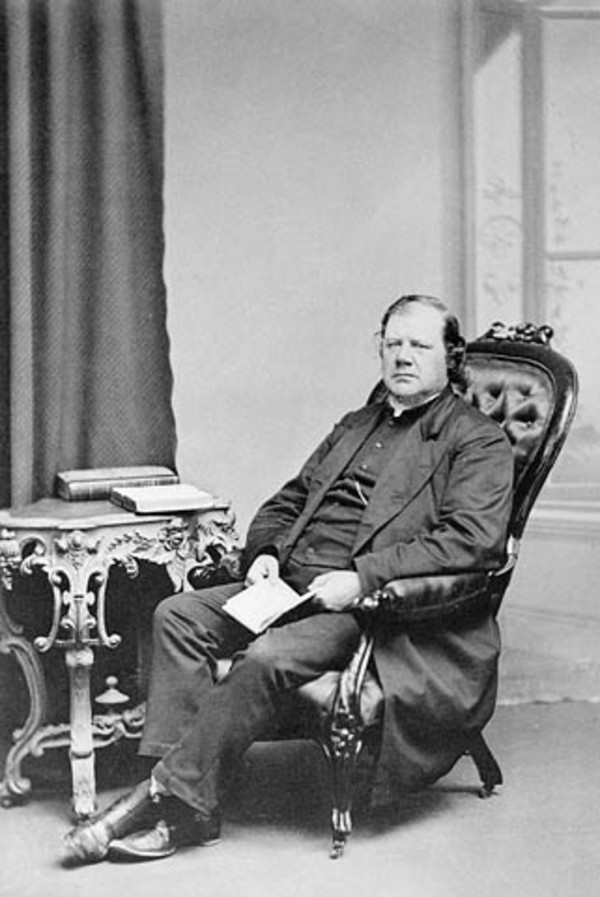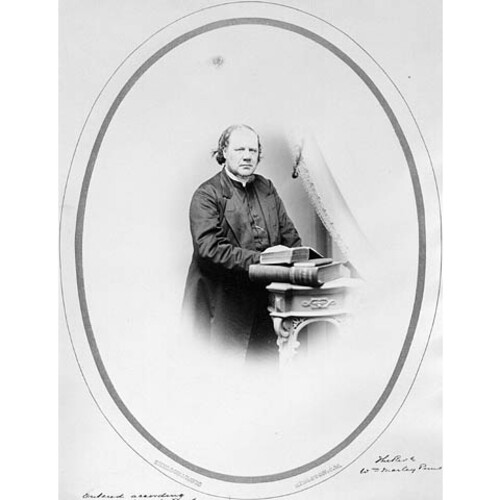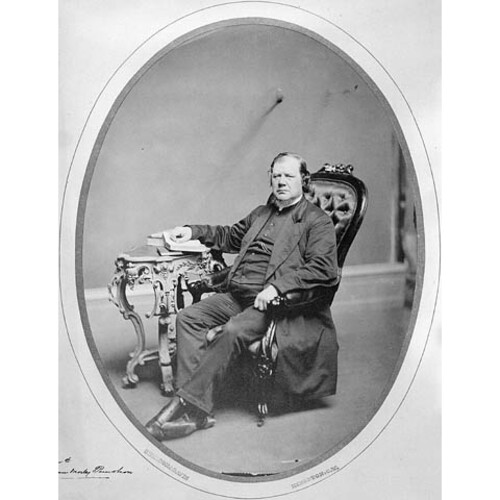PUNSHON, WILLIAM MORLEY, Methodist minister and author; b. 29 May 1824 at Doncaster, England, the only child of John Punshon and Elizabeth Morley; m. first 22 Aug. 1849 Maria Vickers (d. 1858), and they had at least four children; m. secondly 15 Aug. 1868 Fanny Vickers (d. 1870); m. thirdly 17 June 1873 Mary Foster; d. 14 April 1881 at Tranby Lodge, Brixton, Devon, England.
William Morley Punshon’s father was a successful mercer who died in 1840. After a short business career Punshon was received on probation for the ministry in 1845 and ordained four years later. His rise in the church was rapid. He won early attention as a public speaker on religious themes, making an impressive debut at Exeter Hall, the evangelical centre in London, while still in his 20s. He was elected in 1859 to the “legal hundred,” the body of preachers to whom John Wesley had assigned the legal conduct of the Methodist conference. In 1861 he helped to establish and edit the influential Methodist Recorder (London). And, in the early 1860s, Punshon waged a successful campaign to raise over £10,000 to build new churches in resort areas in order to carry the Methodist gospel to the watering-places in England.
Punshon came to Canada in 1868 at a time when the British conference exerted considerable legal authority over the colonial churches. After an initial inquiry by Egerton Ryerson and upon the formal suggestion of the Canadian church, the British conference appointed Punshon president of the conference of the Wesleyan Methodist Church in Canada. Living in Toronto, he held the position for five one-year terms from 1868 to 1872. In 1868 he was also appointed president of the Wesleyan Methodist Conference of Eastern British America (for one year) and the representative of the British conference to the Methodist Episcopal Church in the United States. The Canadian positions gave him power over the administrative and public life of his church (he described his office as “quasi-episcopal”), and his American position gave him the opportunity to tour extensively in the United States.
Coming to Canada also allowed Punshon to marry Fanny Vickers, the sister of his first wife. This type of marriage, still forbidden by English law, was generally accepted in Canada even though its legal status was not fully secure until 1882.
Punshon’s reputation in England and his very visible presence in North America raised the respectability of Canadian Methodism. He took particular interest in missionary activity and in building new Wesleyan churches in the revived Gothic style. Their beauty, Punshon believed, not only spoke to the sacred reality of God on earth, but also to the high position that Methodism enjoyed in Canada where she was free from the shadow of an English establishment church. The greatest architectural monument to his work in Canada was the Metropolitan (Methodist) Church in Toronto.
Punshon used his lectures and sermons to raise funds for these new churches and other Methodist institutions. When Victoria College in Cobourg was faced with bankruptcy by the withdrawal of the government grant in 1868, he campaigned for a new endowment from pulpit and lectern and made a large personal contribution. His generous and conciliatory manner also helped to lay the foundation for the union of the Wesleyan Methodist Church in Canada, the Eastern British America conference, and the Methodist New Connexion Church in Canada. His last conference in 1872 did much of the preliminary work for the union, which would be completed in 1874 after Punshon had returned to England.
Punshon (who had received an lld from Victoria College in 1872) went back to England in 1873 after declining a position teaching moral philosophy at the University of Toronto and offers of well-situated pulpits in the United States. He was elected president of the British Wesleyan conference for 1874 and then accepted the important office of missionary secretary the following year. Declining health limited his activities although he played an active role in support of lay representation in the annual Methodist conferences. A journey to the south of France and Italy failed to restore his strength, and he returned to England where he died in 1881.
William Morley Punshon was one of the most highly regarded English religious leaders to serve in Canada during the Victorian period. His public lectures and sermons during his long career achieved widespread popularity throughout the empire while his administrative ability, especially in support of conciliation, church expansion, and missions, served the British Wesleyan connection well for almost 40 years. Punshon also composed poetry of a meditative and devotional nature. All his writing tended to be parabolical in form and moral in intention; unfortunately, it has not aged well. He is now remembered in Canada primarily for his important contributions to the progress of Wesleyanism in the years immediately following confederation.
William Morley Punshon was the author of “Broken cisterns,” published in The Canadian Methodist pulpit: a collection of original sermons, from living ministers of the Wesleyan Methodist Church in Canada, ed. S. G. Phillips (Toronto and Montreal, 1875), 1–22; Canada: its religious prospects; an address delivered before the English Wesleyan conference, at Manchester, July 26th,1871 (Toronto, 1871); Mutual obligation; or, the duties of the pulpit and the pew to each other, and of both to God: two addresses delivered in the Richmond Street Church, Toronto (Toronto, [1869]), which was also published as The pulpit and the pew: their duties to each other and to God . . . (London, 1869); The prodigal son: four discourses (Toronto, 1868); The Rev. W. M. Punshon, M.A.: a sketch of his life, with sermons recently delivered by him in London, and a variety of choice selections from his public addresses, discourses, and writings (London, 1871); Sabbath chimes; meditations in verse for the Sundays of a year (London, 1868); Select lectures and sermons (Cincinnati, Ohio, 1860); Sermons (2v., London, 1882–84); and Tabor; or, the class meeting: a plea and an appeal; addressed to hearers of the Wesleyan ministry . . . (Toronto, 1855).
UCA, Biog. files, W. M. Punshon; Church hist. files, Ont., Toronto, Metropolitan Methodist Church; Wesleyan Methodist Church in Canada, Minutes, 1867–74. Joseph Dawson, William Morley Punshon: the orator of Methodism (London, [1906]). F. W. Macdonald, The life of William Morley Punshon, LL.D. (London, 1887; 2nd ed., 1887; 3rd ed., 1888). Alexander Sutherland, Methodism in Canada; its work and its story: being the thirty-third Fernley lecture delivered in Penzance, 31st July 1903 (London, 1903; Toronto, 1904). M. A. Banks, “Marriage with a deceased wife’s sister: law and practice in Upper Canada, with a summary of post-confederation changes,” Western Ontario Hist. Notes (London), 25 (1969–70), no.2: 1–6. J. W. Caldwell, “The unification of Methodism in Canada, 1865–1884,” United Church of Canada, Committee on Arch., Bull. (Toronto), 19 (1967).
Cite This Article
William Westfall, “PUNSHON, WILLIAM MORLEY,” in Dictionary of Canadian Biography, vol. 11, University of Toronto/Université Laval, 2003–, accessed April 1, 2025, https://www.biographi.ca/en/bio/punshon_william_morley_11E.html.
The citation above shows the format for footnotes and endnotes according to the Chicago manual of style (16th edition). Information to be used in other citation formats:
| Permalink: | https://www.biographi.ca/en/bio/punshon_william_morley_11E.html |
| Author of Article: | William Westfall |
| Title of Article: | PUNSHON, WILLIAM MORLEY |
| Publication Name: | Dictionary of Canadian Biography, vol. 11 |
| Publisher: | University of Toronto/Université Laval |
| Year of revision: | 1982 |
| Access Date: | April 1, 2025 |






